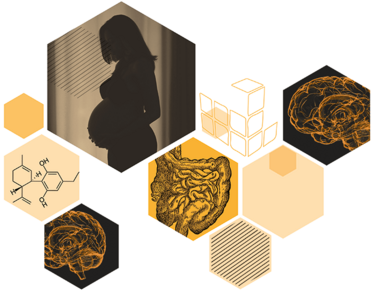The Year in Cannabis Science
The last 12 months have been momentous for the field, with legalization spreading, regulation tightening and science marching ever onwards. Here, we present our picks for the people, papers and technology of 2017 – and ones to watch for 2018. Once you’ve checked out our choices, we’d like to know what you think. Go to tas.txp.to/TCS218/vote and tell us who you think are the top leaders in cannabis science. The winners will feature in the next issue of The Cannabis Scientist.

Cannabis Scientists
In no particular order, ten of the most influential cannabis scientists – drawn from analytical chemistry, biomedical science and plant biology. Cast your vote online to help us pick our cannabis scientists of the year. Go to tas.txp.to/TCS218/vote
Pesticide Problems: Reggie Gaudino, Steep Hill Labs
As Chief Scientific Officer at one of the best known testing labs in California, Gaudino is a thought leader and long-time advocate for a more scientific approach within the industry (see tas.txp.to/tcs/gaudino). Steep Hill was among the first to speak out about the risk of pesticides in cannabis, and in 2017 highlighted the little-known problem of pesticide contamination in clones (https://landing.steephill.com/cleanclones).
Team Effort: Committee on the Health Effects of Marijuana, National Academies of Sciences, Engineering and Medicine
A panel of sixteen scientists who together published the most comprehensive review yet of the health impacts of cannabis and cannabinoids. The report, which reviewed some 10,000 studies, gained coverage in major news outlets worldwide with its balanced view on the benefits and harms of cannabis, covering everything from treating epilepsy with cannabidiol (CBD), to the dangers of driving under the influence of tetrahydrocannabinol (THC). Read the report at https://www.nap.edu/read/24625/chapter/1
The Auditor: Susan Audino, A2LA
As a lab assessor for A2LA, Audino ensures that cannabis testing labs are enforcing good laboratory standards. Not content with improving individual labs’ performance, she is spearheading efforts by analytical standard-setting nonprofit AOAC International to develop consensus standards for testing across the industry. Read more at tas.txp.to/tcs/audino
Gene Genie: Jessica Kristof, Phylos Bioscience
As Vice President of Research and Development at Phylos Bioscience, Kristof has been instrumental in developing the genetic tests offered by the company. The genetic fingerprints of strains have been harnessed to create the Phylos Galaxy, and most recently the Phylos Certified program. If it takes off, the Certified program will allow researchers, growers, suppliers and consumers to know exactly what strain they are dealing with. Read more here.
Crucial Collaborations: Chris Hudalla, ProVerde Laboratories
A long career at instrumentation giant Waters Corporation gave ProVerde founder Hudalla not only a rigorous analytical approach, but a wealth of vendor contacts. ProVerde have collaborated with a string of instrument makers in recent years to develop new methods and technology for cannabis analysis. Read more here.
Quality Campaigner: Robert Martin, CW Analytical
Martin heads up the Association of Commercial Cannabis Laboratories, a group of 20+ cannabis testing labs who commit to quality standards including integrity, proficiency, reliability and no “dry labbing.” Read more at tas.txp.to/tcs/martin
Addictive Research: Yasmin Hurd, Icahn School of Medicine at Mount Sinai
Hurd is a Professor of Neuroscience, Psychiatry, and Pharmacology and Systems Therapeutics at the Icahn School of Medicine and Director of the Addiction Institute at Mount Sinai, where her research explores the effects of cannabis in the brain. Her past studies have highlighted the dangers of THC in the developing brain; more recently, she hit the headlines with her work on treating opioid addiction with CBD (tas.txp.to/tcs/opioid)
Testing, Testing: Amanda Rigdon, Emerald Scientific
Formerly with Restek, Rigdon joined Emerald in 2016 as Chief Technology Officer, where she recently oversaw the biggest ever Emerald Test (a bi-annual inter-laboratory comparison and proficiency test organized by the company). The test has now also gained the seal of approval from Colorado regulators to act as a third party provider of proficiency testing in the state.
Persistence Pays: Sue Sisley (MAPS) and Marcel Bonn-Miller (University of Pennsylvania)
After a long road to FDA approval, the researchers treated the first patient in their much-anticipated world-first clinical trial of cannabis for PTSD in February 2017, and have so far recruited 32 of the study’s planned 76 participants (http://www.maps.org/research/mmj/marijuana-us).
Lifetime Achievement: Raphael Mechoulam, Weizmann Institute of Science, Israel
Co-discoverer of THC and CBD in the 1960s, Mechoulam went on to uncover the endocannabinoid system. Now 86, the veteran researcher is still active, publishing several recent papers on the effects of cannabinoids in the body, and speaking at conferences worldwide.

Research Round-Up
ICYMI: ten must-read scientific papers from the last 12 months.
CBD Clinical Trials in Epilepsy
GW Pharmaceuticals published the results of two Phase III clinical trials of CBD in patients with rare epilepsy syndromes, in two of the world’s most prestigious medical journals. Both trials showed a reduction in seizure frequency in those receiving CBD (versus placebo) as an add-on to their standard antiepileptic drugs, though there was also an increase in adverse effects.
Read the papers: http://www.nejm.org/doi/full/10.1056/NEJMoa1611618; http://www.thelancet.com/journals/lancet/article/PIIS0140-6736(18)30136-3/fulltext
Buyer Beware
A University of Pennsylvania study revealed that 70 percent of CBD extracts sold online are inaccurately labeled. The majority of the 84 products tested contained either more or less CBD than advertised, while others contained significant quantities of THC. The authors call for more regulation of CBD extracts and edibles in the USA.
Read the paper: https://jamanetwork.com/journals/jama/article-abstract/2661569?redirect=true
NIDA Cannabis Falls Short
Daniela Vergara and colleagues add to mounting evidence that the cannabis supplied to researchers by the US government bears little relation to what is available from legal dispensaries. NIDA-supplied cannabis had much lower levels (and less diversity in levels) of both THC and CBD.
Read the paper: http://go.nature.com/2nCQfKH
Don’t Judge a Book by its Cover
In this study, examiners were asked prior to conducting neuropsychological assessments whether they thought a participant was a chronic cannabis user. Their answer predicted how the participant would score, regardless of whether they were in fact a cannabis user, suggesting that the examiner’s findings were influenced by their expectations.
Read the paper: https://www.ncbi.nlm.nih.gov/pubmed/29342226
Cannabis in Pregnancy
Cannabis use is on the rise in pregnant women in California, raising concerns about the impact of prenatal exposure to cannabinoids. From 2009 to 2016, cannabis use in pregnant women went from 4 to 7 percent, while in pregnant women aged 18–24 the results were more dramatic, going from 12 to 22 percent.
Read the paper: https://jamanetwork.com/journals/jama/article-abstract/2667052?redirect=true
The Shape of Things to Come
Chinese researchers have revealed the 3D structure of the CB1 receptor when bound to an agonist (activating molecule). Activation of the receptor causes major structural changes, which may be relevant for pharmaceutical scientists hoping to develop drugs targeting the receptor.
Read the paper: http://go.nature.com/2GKADgp
Brain Power
A small daily dose of THC appears to restore cognitive function in old mice, according to this study, published in Nature Medicine. Of course, there is no guarantee that what happens in mice will happen in humans (for a start, the lifespan of a mouse only stretches to a year or two), but the possibilities are certainly intriguing.
Read the paper: http://go.nature.com/2E0hMjA
Cannabis and Opioids
Although some researchers believe CBD could have anti-addiction properties, a major survey on alcohol and drug use suggests that cannabis users (who are taking both THC and CBD) are at least equally (and possibly more) likely to develop an opioid use disorder than never-users. What is the true role of cannabis in addiction? Perhaps 2018 will bring us a step closer to the answer.
Read the paper: https://www.ncbi.nlm.nih.gov/pubmed/28946762
Autism Aid?
Dravet Syndrome is a rare childhood disorder that causes epilepsy and in some cases autism-like traits. A study from researchers in Seattle showed that CBD not only reduced seizures, but appeared to improve social interaction in a mouse model of the disease. A clinical trial is set to start next year in Israel to investigate the effect of CBD on patients with autism.
Read the paper: http://www.pnas.org/content/114/42/11229
Gut Feeling
In this study, researchers explored how endogenous cannabinoid anandamide and its receptor CB2 regulate immune reactions in the gut – preventing the gut from overreacting to innocuous foodstuffs.
Read the paper: http://www.pnas.org/content/114/19/5005
Enabling Technology
2017 saw several exciting new scientific tools specifically designed for the cannabis industry. Here’s our Top 3.
G908 3-in-1 Cannabis Analyzer, 908 Devices
Leverages “ballistic” GC and high-performance MS to perform three state-required cannabis tests on one multi-column device: residual solvents, terpenes and total potency.
https://908devices.com/products/g908/
Cannabis Analyzer for Potency, Shimadzu
HPLC system to determine levels of 11 cannabinoids, complete with column, mobile phase, certified standards, methods, batches, and reports.
https://www.ssi.shimadzu.com/products/product.cfm?product=hplc_cannabisAnalyzerPotency
Cannabis Breathalyzers, Hound Labs and Cannabix Technologies
Legalization of cannabis has led to fears of a spike in road traffic accidents caused by people driving under the influence of the drug, creating demand for roadside testing. Two labs have THC “breathalyzers” under development; the Cannabix Technologies device is based on high-field asymmetric waveform ion mobility spectrometry (FAIMS), while Hound Labs are keeping their proprietary technology under wraps for now.
https://houndlabs.com/
http://www.cannabixtechnologies.com/

What’s Next?
The biggest news for the industry as a whole this year is likely to be the legalization of cannabis in Canada, slated for July 2018. We can expect scientific advances too, with stricter regulations forcing laboratories to develop better, more standardized testing, and several exciting clinical trials ongoing. Here are some topics we will likely be covering in 2018.
Cannabis science in Canada
Canada is the big story of 2018, and we can expect to see scientific as well as regulatory advances. Animal and human studies are ongoing at major Canadian institutions, while start-ups are thriving. One example: Vancouver-based Anandia Labs, led by plant biologist Jonathan Page, recently secured financing for their planned Cannabis Innovation Centre, to work on genetics, tissue culture, extractions and processing.
Growth of veterinary applications
The use of cannabinoids in veterinary medicine is an interesting development in the field. For example, Stephanie McGrath at Colorado State University is leading a study into the use of CBD for epilepsy and osteoarthritis in dogs.
Click here for more animal magic.
Citizen science
In recent years, information collected from the public has been used in fields from neurology to environmental monitoring – could similar approaches be used in cannabis science? The Dosing Project is collecting information from medical users around the USA, to evaluate trends in efficacy (https://www.thecesc.org/the-dosing-project). Meanwhile, the CannaData project is asking growers and members of the public to send in photos of cannabis leaves from around the world to study the morphology of different Cannabis species (http://cannabisgenomics.org/cannadata/).
More clinical data
With clinical trials underway for conditions from autism to sickle cell disease, we can expect more intriguing studies in 2018. Clinicaltrials.gov entries that caught our eye included studies on Tourette’s (https://clinicaltrials.gov/ct2/show/NCT03247244?term=cannabis&recrs=adf&type=Intr&draw=2&rank=9), chronic pain (https://clinicaltrials.gov/ct2/show/NCT03337503?term=cannabis&recrs=adf&type=Intr&draw=2&rank=10) and the pharmacogenetics of cannabinoids (https://clinicaltrials.gov/ct2/show/NCT00678730).












